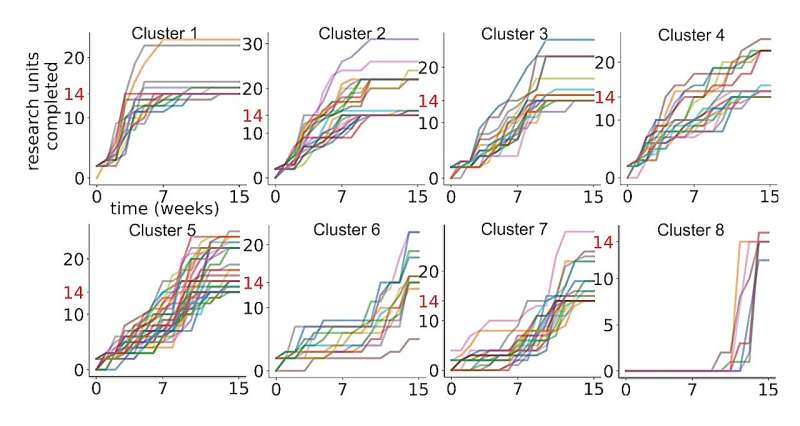This article has been reviewed according to Science X's editorial process and policies. Editors have highlighted the following attributes while ensuring the content's credibility:
fact-checked
trusted source
proofread
From dawdling to doing: The science of procrastination

Procrastination, the deliberate but detrimental deferring of tasks, has many forms. Sahiti Chebolu of the Max Planck Institute for Biological Cybernetics has used a precise mathematical framework to understand its different patterns and their underlying reasons. Her study could help tailor individual strategies to tackle the issue. The research can be found in Proceedings of the Annual Meeting of the Cognitive Science Society.
"Why did I not do this when I still had the time?" Whether it is filing taxes, meeting a deadline at work, or cleaning the apartment before a family visit, most of us have already wondered why we tend to put off certain tasks, even in the face of unpleasant consequences. Why do we make decisions that are harmful to us—against our better knowledge? This is precisely the conundrum of procrastination.
Procrastination, the deliberate but ultimately detrimental delaying of tasks, is not only hampering productivity, but has also been linked to a host of mental health issues. So it is certainly worth asking why this much talked-about phenomenon has such a grip on us—and what it actually is.
"Procrastination is an umbrella term for different behaviors," says computational neuroscientist Sahiti Chebolu from the Max Planck Institute for Biological Cybernetics. "If we want to understand it, we need to differentiate between its various types."
One common pattern is that we defect on our own decisions: We might, for example, set aside an evening for the tax return, but when the time has come, we watch a movie instead. Something else is going on when we do not commit to a time in the first place: we might be waiting for the right conditions.
The possible patterns of procrastination are myriad: From starting late to abandoning a task halfway through, Chebolu classified them all and identified possible explanations for each: misjudging the time needed or protecting the ego from prospective failure are just two of them.
The short-sighted brain
Can such a classification really help you get stuff done? Chebolu is convinced that a mathematically precise understanding of the mechanism at play is the first step to tackling it. She frames procrastination as a series of temporal decisions. What exactly happens, for example, when we schedule our tax declaration for Friday night but then succumb to the temptations of a streaming service?
One way to think of decision-making is that our brain adds up all the rewards and penalties we expect to gain from the alternative behaviors: watching a movie or doing the annoying paperwork. Quite naturally, it then picks the course of action that promises to be most pleasant overall.
But does the fun of a movie night outweigh the dismay at a hefty failure-to-file penalty? There is one important detail: consequences in the distant future are weighted less by the brain in its summation of positive and negative outcomes.
To a certain degree, this is normal and even useful; after all, the more distant future is necessarily fraught with uncertainties. "Only when we place excessive value on experiences in the present and not enough on those lying further ahead," Chebolu explains, "such a decision-making policy becomes quickly maladaptive."
So much for the theory. To study real-life procrastination, Chebolu delved into large datasets provided by New York University. The data showed a log of students who were required to participate in a set number of hours of experiments over the course of a semester.
Some rid themselves of the task right away; others distributed it evenly over several weeks—and, sure enough, still others shirked it until it was almost too late. Chebolu ran simulations to reproduce their behavior. Which explanations, she asked, would best be able to account for different patterns of procrastination?
It might be tempting to lay the blame on our brain's preference for immediately rewarding activities. But there is definitely more at play: for each pattern of how the New York students deferred their task, Chebolu found multiple possible explanations.
"Uncertainty is another major factor in procrastination," she stresses. This could be the failure to predict how much time we will need to unearth all receipts for deductible expenses. But uncertainty can also mean lacking confidence in our own abilities or doubting whether the task helps us achieve our goals.
Chebolu is confident that understanding procrastination as a series of temporal decisions and detecting where and why we usually take a wrong turn can inform interventions: If you discover, for instance, that your brain is a bit too biased towards instant gratification, giving yourself short-term rewards might help.
Those who tend to underestimate the time needed for their grunt work could try setting themselves time-bound goals. And if you find yourself abandoning your chores quickly, you might want to avoid distracting environments.
No matter in which category of procrastination you fall (and you almost certainly fall into some of them sometimes), you are not just lazy. Recognizing this and forgiving yourself for procrastinating in the past is a good first step towards more productivity.
More information: Sahiti et al. Optimal and sub-optimal temporal decisions can explain procrastination in a real-world task. Proceedings of the Annual Meeting of the Cognitive Science Society. (2024). escholarship.org/uc/item/2mg517js#main



















